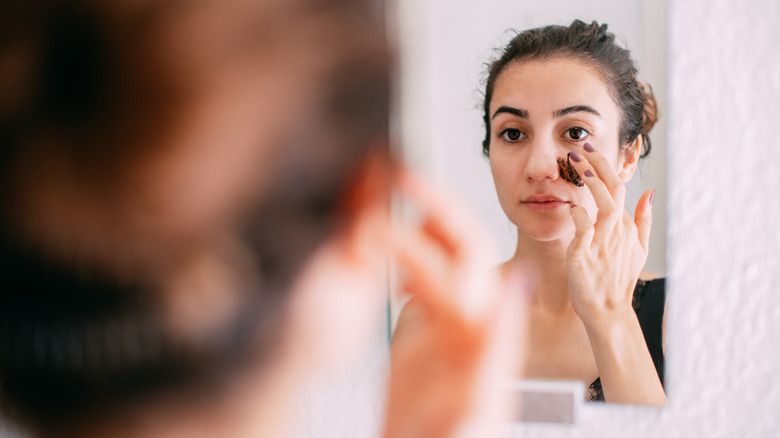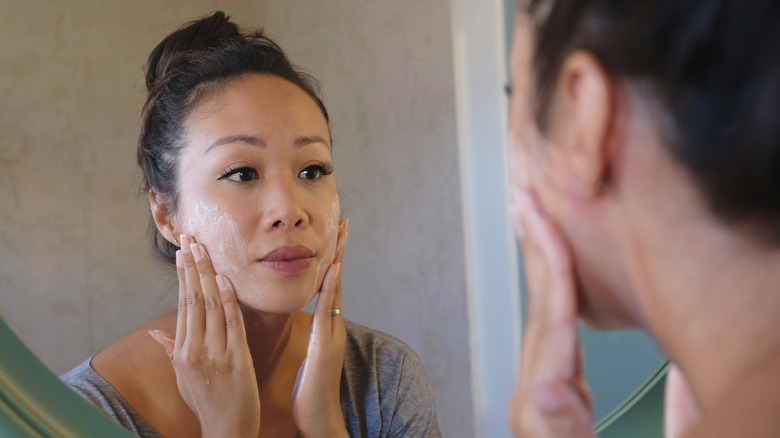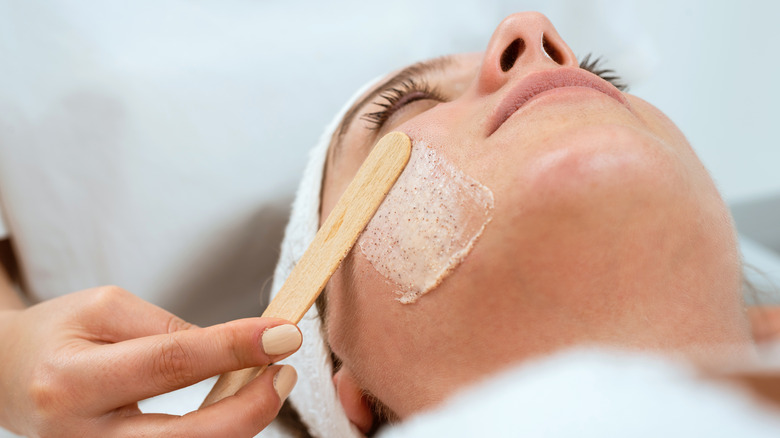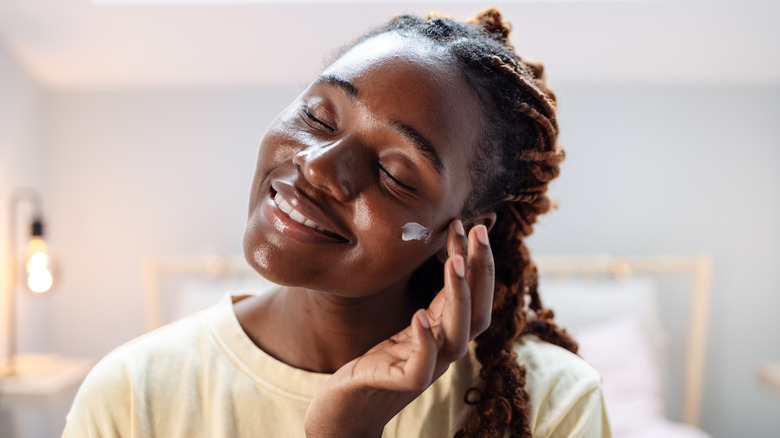What To Do If You Accidentally Over-Exfoliate Your Skin
Pretty much any skincare fanatic knows that regular exfoliation is a crucial part of any routine. However, figuring out what 'regular' means isn't as simple as you think. In fact, one of the most common mistakes people make when exfoliating is doing it way too often. And unfortunately, this leads to some pretty nasty side effects, such as redness, tightness, irritation, itchy patches, flaking, and even increased breakouts.
As if dealing with painful skin weren't already a bad enough consequence, experts say that over exfoliating can also cause some serious damage to your skin's overall health. Clinical aesthetician and co-founder of Mortar and Milk Skin Clinic, Pamela Marshall, explained to Glamour U.K., "If you are exfoliating the skin too often, the skin's barrier function can become compromised, skin can become dehydrated and capillaries can become damaged."
So, then what are you supposed to do if it's too late and you've already over-exfoliated your skin? Well, first off, don't panic. You don't need to swear off exfoliants entirely. As dermatologist Dr. Geetika Mittal Gupta explained to Vogue India, "First you want to heal the damage skin, then replenish the lost moisture, and then re-build healthy skin cells." And there are a few ways to do that.
Apply products to stop the immediate irritation
As soon as you realize you've over-exfoliated, there are a couple of things you can do to try and reduce the effects it'll have on your skin — at least in the short term. Geria Dermatology's dermatologist Dr. Aanand Geria told Healthline that a cold compress can be applied to the area as soon as any irritation occurs to try and help any burning sensations you may be feeling. However, this may only work immediately after the skin has been irritated.
Dr. Geria also noted that a hydrocortisone cream can help to bring down redness and inflammation, as well as Aloe gel (which actually has a bunch of different uses for the body). "[It's] known to have healing properties as well but can sometimes be irritating depending on how open and raw the areas are, in which case applying the actual aloe plant can help," she explained of Aloe gel. Equally, Melanie Palm noted to Allure that some people may need to apply a topical cream to help the problem. Look out for one containing peptides and reparative ingredients.
Stop exfoliating (for a while)
Of course, exfoliating the skin is super useful for a number of reasons, but if you've done it too much it only makes sense to give your skin a break. "Leave your skin alone," Dr. Gupta advised to Vogue India. "It will heal all by itself, but it needs time and proper care, which in this case means not doing much to it." How long you'll want to stop for will depend on your skin and how much it's been over-exfoliated, but at least wait until there's no irritation or signs of damage left. Board certified dermatologist Dr. Marie Hayag recommended to The Strategist at least one week's rest.
No exfoliation means using nothing that will remove dead skin cells. That includes AHA (Alpha Hydroxy Acid) and BHA (Beta Hydroxy Acid) chemical exfoliants, exfoliant tools (such as dry brushing or wet brushing), or granular scrubs. A few of the more common ingredients to look out for include glycolic acid, lactic acid, salicylic acid, and fruit enzymes. There are a lot out there though, so do your research on exactly what's in your skincare if you're unsure.
When it's time to exfoliate again, try using something less potent or exfoliate less frequently. For home exfoliation, dermatologists told Byrdie you should aim for around two to three sessions a week, but try to build back up slowly. Equally, dermatologist Dr. Simal Soin advised you should only be getting a peel once a week or every two weeks.
Change up your products to help sooth the skin
In addition to changing your exfoliation routine, you may also want to swap out some of the other things you're putting on your face while it's not feeling its best. After over-exfoliating, Dr. Gupta recommended to Vogue India changing products like toners and moisturizers that contain fragrance or alcohol, as they may only irritate and dry out the skin more. It's also a good idea to avoid harsher chemicals like retinoids until signs of irritation are gone. That's because retinoids (including retinol) can act as an exfoliant and may be too harsh for your skin while it's damaged. If you've been using retinoids with other exfoliants, that may be what's left your skin so sore.
Instead, there are a few ingredients to look for that will help heal the skin. Dr. Gupta recommended the likes of hyaluronic acid, zinc oxide, CoQ10, squalane, shea butter, and glycerin. "These are all hydrating and calming ingredients," she explained. Board-certified dermatologist Melanie Palm also recommended to Allure trying a cleanser with mild ingredients to keep skin hydrated.
Pamala Marshall had some suggestions on the exfoliants to try when your skin is ready, telling Glamour U.K. Polyhydroxy Acids may be a good option."[They] exfoliate without causing the same sort of injury to the skin's barrier that AHAs or scrubs can cause," she explained. "Not only do they gently exfoliate without harsh microbeads or crystals that may further damage sensitive skin, they can also hydrate the skin."
Pile on the sunscreen
Of course, we all know that sunscreen is super important. No matter if it's super sunny, a little rainy, winter, or summer. We should all be wearing a product with an SPF every single day. But if you've got damaged skin from too much exfoliating, then you need to make sure it's protected from the sun potentially more than ever. As Dr. Lauren Penzi, a board-certified dermatologist, told HuffPost, "Over-exfoliation will only make the skin more sensitive and more susceptible to the sun's damaging UV rays." And that could result in our already damaged skin becoming even more damaged. That's in addition to all the other dangers extended sun exposure can cause to the skin.
Just make sure though that the sunscreen you're applying won't further irritate your skin, though. Look for something really gentle and moisturizing that will help your skin stay hydrated, which may mean applying a product that's a sunscreen only, and not something like a foundation with an SPF number and sunscreen in it.
See your dermatologist if you're experiencing serious or consistent side effects
If you're finding the side effects of your over-exfoliation are lasting a while without going away or are causing serious pain, it may be best to see your doctor or dermatologist about the issue. You'll also want to do this if you're finding your skin consistently feels uncomfortable after any kind of exfoliating, because they may also be able to tell you explicitly what it is you're doing wrong and how to fix it by taking into account things like your skin type and sensitivity.
Not only will they be able to give you personalized recommendations on things like what exfoliation technique and ingredients are best for you though, a professional also be able to advise you on the best way to help your skin to heal after a heavy exfoliation session. They could even prescribe specific products that may not be available over the counter to help sooth and heal the affected areas.





